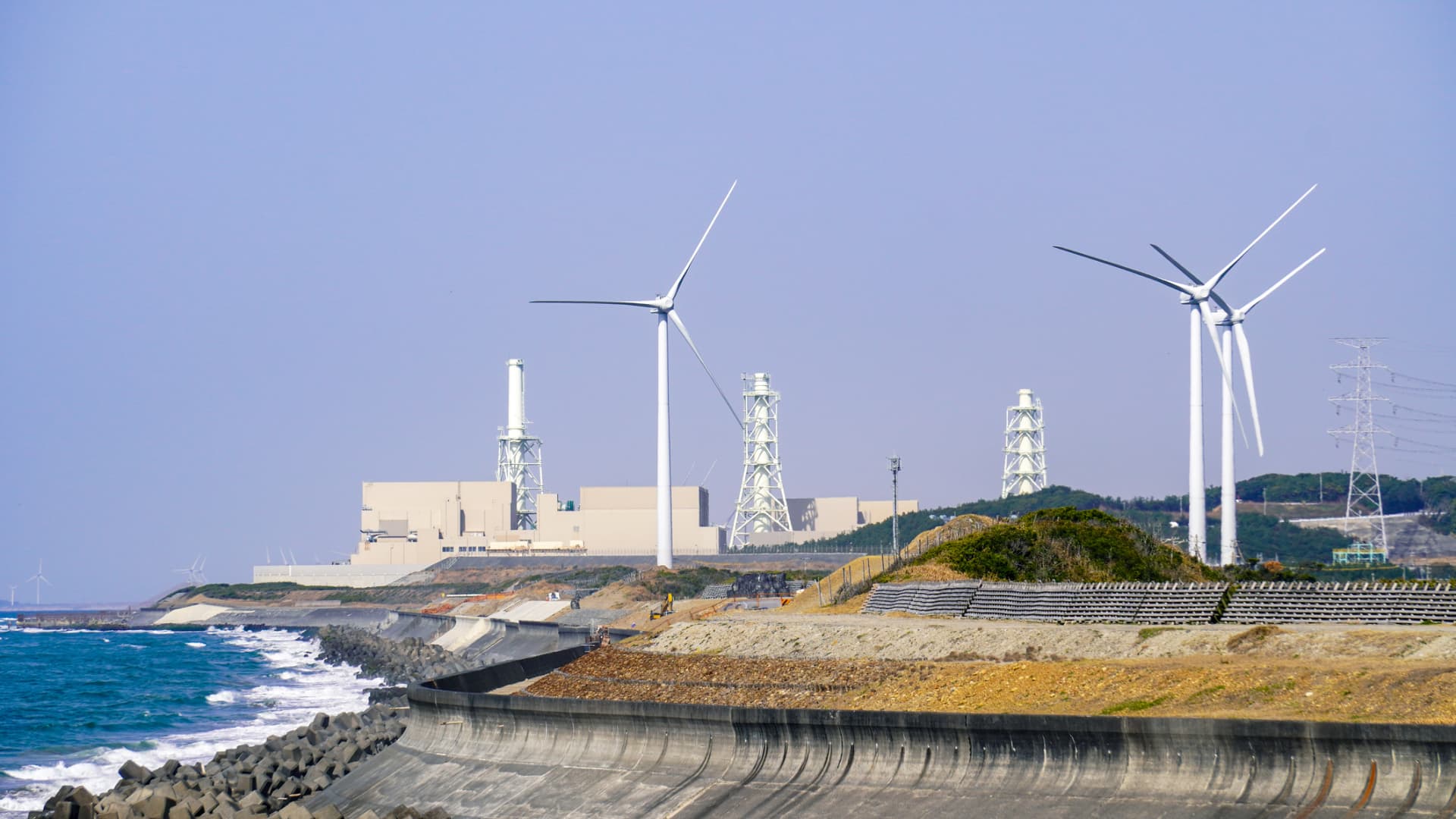
This image, from March 2022, shows wind turbines in front of the Hamaoka Nuclear Power Station in Japan. The country is now planning to use more nuclear power in the years ahead.
Korekore | Istock | Getty Images
Japanese plans to pivot back to using more nuclear power have been welcomed by the International Energy Agency, with one of the organization’s directors telling CNBC it represented “very good and encouraging news.”
On Wednesday, the prime minister of Japan said his country would restart more idled nuclear power plants and look into the feasibility of developing next-gen reactors. Fumio Kishida’s comments, which were reported by Reuters, build upon remarks he made back in May.
They come at a time when Japan — a big importer of energy — is looking to bolster its options amid ongoing uncertainty in global energy markets and the war between Russia and Ukraine.
Speaking to CNBC’s “Squawk Box Europe” Thursday morning, Keisuke Sadamori, who is director of the IEA’s office for energy markets and security, was positive about Japan’s strategy.
“This is … very good and encouraging news both in terms of energy supply security and climate change mitigation,” he said, adding that Japan had been “burning a lot of fossil fuels in order to fill the gap from the lack of nuclear power since the Fukushima … accident.”
Fossil fuel markets, in particular natural gas markets, were “very tight,” Sadamori explained, noting that this was especially the case in Europe.
“This restart of the Japanese nuclear power plants would be good in terms of freeing up substantial amount[s] of LNG to the global market,” he said.
Sadamori, who previously held positions in Japan’s Ministry of Economy, Trade and Industry and was executive assistant to a previous Japanese prime minister in 2011, was asked about the timeframe for the construction of new nuclear plants.
The new builds, he replied, would take a long time. “I understand that the announcement by … Prime Minister Kishida yesterday was focusing more on the new types of nuclear power plants, including SMRs — small modular reactors.”
“They’re still in, basically, a development stage, so … we need to accelerate those developments,” he added. The more significant aspects were, he argued, the restart of existing plants and the extension of existing plants’ lifetime.
A big shift
If fully realized, the moves being planned by Japan would represent a turnaround for the country’s energy policy following 2011′s Fukushima disaster, when a powerful earthquake and tsunami resulted in a meltdown at Japan’s Fukushima Daiichi nuclear power plant.
Given its recent history, the IEA’s Sadamori was asked about current public sentiment in Japan toward nuclear. “That’s the most difficult part,” he said, adding that the Japanese people still had some concerns about safety.
Citing “difficult energy market situations” as well as Japan’s “very tight electricity market,” Sadamori said public sentiment in the country was nevertheless “changing a little.”
“We are seeing more people supporting the restart of the nuclear power plants, based on … recent surveys by the major Japanese newspapers,” he added.
“So I consider that things are improving a bit, but I think that the … public, local acceptance issue still continues to be a very difficult part of the nuclear restart.”
The importance of public support is emphasized in an outline of Japan’s 6th Strategic Energy Plan. “Stable use of nuclear power will be promoted on the major premise that public trust in nuclear power should be gained and that safety should be secured,” it states.
Japan is targeting carbon neutrality by 2050. Under an “ambitious outlook,” its Strategic Energy Plan envisages renewables accounting for 36% to 38% of its power generation mix in 2030, with nuclear responsible for 20% to 22%.
While Japan may be refocusing its attention on nuclear, the technology is not favored by all.
Critics include Greenpeace. “Nuclear power is touted as a solution to our energy problems, but in reality it’s complex and hugely expensive to build,” the environmental organization’s website states.
“It also creates huge amounts of hazardous waste,” it adds. “Renewable energy is cheaper and can be installed quickly. Together with battery storage, it can generate the power we need and slash our emissions.”
During his interview with CNBC, Sadamori was asked why focusing on renewable sources and directing investment toward such areas was less viable for Japan than returning to nuclear.
The country, he said, had “very ambitious programs for the expansion of renewable sources.” These included solar photovoltaic and wind, especially offshore wind.
While Europe had “massive” offshore wind resources, Japan was “less endowed with … good renewable sources in that respect.”
To this end, nuclear power, in particular the active use of existing plants, should be “a very important part” of the strategy to lower emissions and achieve carbon neutrality by mid-century.







